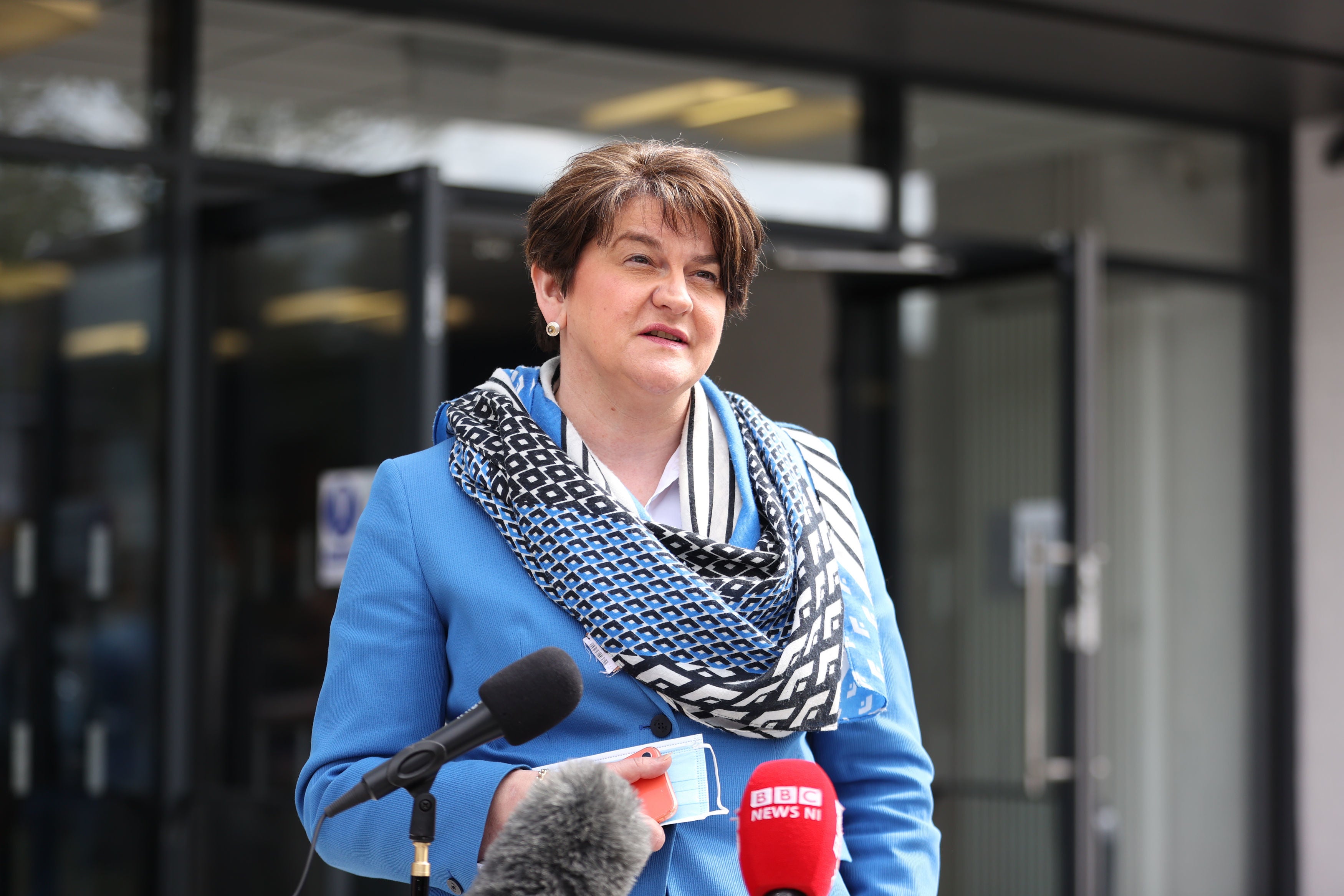Arlene Foster paid the price for trusting Boris Johnson – her successor is unlikely to make the same mistake
Since January, Foster has been in the impossible position of trying to implement a protocol that disrupted trade from Great Britain to the province while her party came out against it, writes Andrew Grice


The resignation of Arlene Foster as leader of the Democratic Unionist Party (DUP) could have significant implications for the Irish peace process and the UK’s fraught relationship with the EU.
Foster has paid the price for trusting Boris Johnson to keep his promise not to impose a trade border in the Irish Sea; her words hailing him as a champion and friend of the Union came back to haunt her. She announced her departure as first minister and DUP leader after losing the confidence of many of her party’s Northern Ireland assembly members and MPs.
Under her, the DUP backed Brexit and reluctantly swallowed Johnson’s Northern Ireland protocol. But since January, Foster has been in the impossible position of trying to implement a protocol that disrupted trade from Great Britain to the province while her party came out against it. The DUP faces an existential threat, and is losing support of traditionalists to the hardline Traditional Unionist Voice (TUV) while seeing younger and socially liberal voters shift to the non-sectarian Alliance Party.
UK ministers say Foster was more pragmatic than her tough rhetoric suggested. The temptation for the DUP will be to choose a hardliner such as Edwin Poots, the province’s agriculture minister, who memorably declared when Foster became first minister that her “most important job” would remain “that of a wife, mother and daughter”.
The DUP, founded by the Rev Ian Paisley 50 years ago, has never held a leadership election — its head normally emerges through consensus. But this time there could be a vote among its assembly members, MPs and peers. Poots’ rivals might include the MPs Jeffrey Donaldson and Gavin Robinson, who are viewed as more pragmatic than him. The DUP might opt to split Foster’s two roles, with an assembly member like Poots becoming first minister and an MP taking over as party leader.
A hardline leader in Belfast would put the power-sharing executive with Sinn Fein and other parties under huge pressure at a highly sensitive time. In recent weeks, the province’s streets saw the worst violence for many years, sparked partly by anger over the impact of Johnson’s protocol.
UK ministers fear privately the executive might collapse under the strain. But the only alternative – another period of direct rule from London – might put the fragile peace process at risk. If the executive survives, elections to the assembly are due in a year’s time. The DUP looks certain to fight on a pledge to scrap the protocol; the assembly is due to vote in 2024 on whether to keep it. But a split in the unionist vote in next year’s election could see Sinn Fein emerge as the biggest party, which would be seen as another step towards a united Ireland and could collapse the executive.
A more aggressive DUP leader might increase the pressure on the EU to give ground over the protocol. Although the war of words between the UK and EU over the agreement was scaled down amid the street violence, big differences remain. The UK government is amassing evidence that goods coming from Great Britain to the province have little chance of ending up in Ireland, so it can argue the EU can relax stringent checks designed to protect its single market.
Brussels suspects Johnson of trying to show the protocol is unworkable in the hope the EU will renegotiate the deal he signed up to. It won’t. The EU wants the UK to align with its rules for food and plant products, which would make sense and potentially resolve the dispute over the protocol. But it would undermine Johnson’s cherished “sovereignty” and the UK’s ability to strike trade deals with other countries.
The new DUP leader will not enjoy the clout Foster wielded when she initially scuppered Theresa May’s withdrawal agreement because the Tories were dependent on DUP votes in the Commons. But the election process will be watched closely and nervously in London, Brussels and Washington; Foster’s successor will be a big player on an important stage at a critical time.



Join our commenting forum
Join thought-provoking conversations, follow other Independent readers and see their replies
Comments